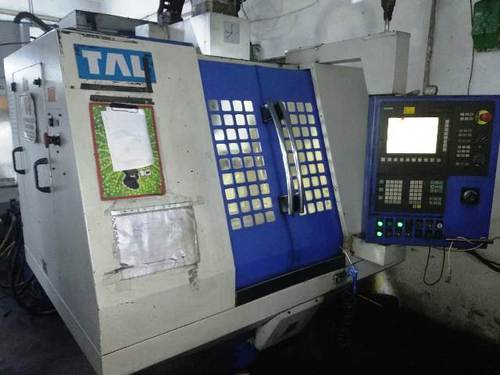Posted on 17th Jun 2024

Vertical Machining Centers (VMCs) have revolutionized manufacturing processes across industries by offering versatility, precision, and efficiency in machining operations. This article explores the capabilities, applications, and benefits of VMC machines, highlighting their pivotal role in modern industrial settings.
VMC machines are computer numerical control CNC machines that operate with a vertical orientation of the spindle axis. They are equipped with a cutting tool that moves in three directions (X, Y, and Z axes), allowing for complex machining operations on a variety of materials including metals, plastics, and composites. This vertical setup enables easy access to the workpiece from multiple angles, facilitating efficient and precise machining.
VMC machines find extensive applications across diverse industries:
Automotive Manufacturing: Used for producing engine components, transmission parts, chassis components, and intricate automotive prototypes.
Aerospace Industry: Vital for machining aircraft components, turbine blades, structural parts, and other critical aerospace components requiring high precision and reliability.
Medical Device Manufacturing: Employed in fabricating surgical instruments, orthopedic implants, and medical equipment parts with stringent quality requirements.
Tool and Die Making: Essential for creating molds, dies, and tooling used in injection molding, stamping, and other manufacturing processes.
Electronics Industry: Used for manufacturing precision components and housings for electronic devices, ensuring dimensional accuracy and high-quality finishes.
VMCs offer exceptional precision, achieving tight tolerances and surface finishes required for demanding applications. The ability to control tool movements in multiple axes ensures consistency and reliability in machining operations.
These machines accommodate a wide range of machining tasks, from simple drilling and milling to complex contouring and 3D machining. Their versatility allows manufacturers to handle diverse workpiece geometries and materials efficiently.
VMC machines feature high-speed spindles and rapid tool-changing capabilities, minimizing downtime and optimizing production throughput. Enhanced automation and integration with CAD/CAM software further streamline workflows and reduce cycle times.
By improving machining efficiency and reducing scrap rates, VMC machine contribute to overall cost savings in manufacturing operations. They offer a competitive edge by accelerating time-to-market for new products and prototypes.
Successful implementation of VMC machines requires:
Operator Training: Skilled operators proficient in CNC programming and machine operation are essential for maximizing machine capabilities and ensuring safe operation.
Tooling and Workholding Solutions: Selecting appropriate cutting tools, fixtures, and workholding solutions tailored to specific machining tasks enhances efficiency and ensures part quality.
Maintenance and Support: Regular maintenance schedules and prompt technical support from manufacturers or service providers are crucial for minimizing downtime and optimizing machine performance.
Looking ahead, advancements in VMC technology continue to focus on:
Integration of Automation: Increasing automation through robotics and IoT connectivity to enhance productivity and reduce manual intervention.
Enhanced Precision and Speed: Innovations in spindle technology, tool materials, and control systems to achieve higher precision, faster machining speeds, and improved surface finishes.
Digital Twin and Virtual Simulation: Utilizing digital twin technology for virtual machining simulations to optimize tool paths, predict performance, and minimize errors before actual machining.
VMC machines available on CM Industry Supply Automation represent a cornerstone of modern manufacturing, offering unmatched capabilities in precision machining across various industries. Their ability to handle complex geometries, achieve high tolerances, and enhance productivity makes them indispensable tools in achieving operational excellence and maintaining competitiveness in the global market. As technology evolves, the continued adoption and advancement of VMC machines promise to further revolutionize manufacturing processes, driving innovation and efficiency in industrial production worldwide.